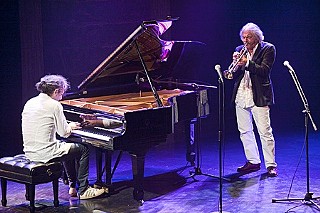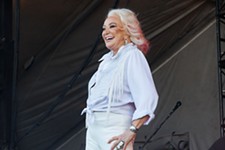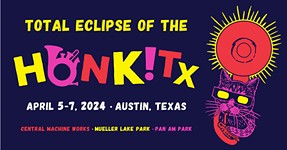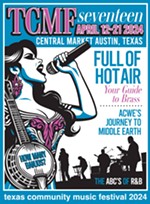The Pilgrim and the Stars
Q&A with Italian trumpet standard Enrico Rava at the Montréal Jazz Festival
By Raoul Hernandez, 4:26PM, Fri. Jul. 10, 2009
Intimacy defines jazz. Cinematic images of a horn player in a dark alley, blowing a forlorn tune – a daily occurrence in most big cities, including Austin, where the Frost Bank plaza on Congress Ave. makes an ideal stage for blowing brass – mirrors real life while also flickering inside the cerebral screening room of listeners piping jazz into their homes, lives, and iPods. That trumpet player, saxophonist, or piano trio laying down their truth over a single session in some cocooned studio in Oslo bounces off the tunnel of the enthusiast’s Eustachian tube until it reaches the brain pan where it echoes like coins in a fountain. Jazz remains the ultimate inner science.
So rise somber tones from the silver fox Enrico Rava, whether painting January’s New York Days (ECM) in skyscraper grays, or shedding wintry light on 2007’s The Third Man with pianist Stefano Bollani. Sitting with the Genoa-dwelling trumpet player, 70 next month, in the dark recesses of a noisy hotel bar a few hours before his headlining set at the Montreal Jazz Festival last Tuesday proved no less intimate. Speaking in Spanish, leftover from a marriage to an Argentinean, Rava told a timeless tune no less smoldering still-life than the burners from his 1975 ECM debut The Pilgrim and the Stars. His set with Bollani later that evening left its own brand.
Austin Chronicle: How well do you know the United States, and how well does it know you?
Enrico Rava: A little. I lived in New York for 10 years beginning in 1967 – ’67 to ’77. I worked in Los Angeles, North Carolina, Atlanta. In Atlanta, I worked with a well-known Italian visual artist by the name of Michelangelo Pistoletto, and with Morton Feldman the composer. We worked on a citywide project, with students and everything, so they gave me an honorary citizenship. I also know Dallas, and Fort Worth. But I don’t ‘know’ it. I know New York, a little of San Francisco, Boston.
AC: What year did you first come to the states?
ER: 1967. There was Vietnam and everything. I came playing with an American musician named Steve Lacy. He died a couple years ago. We had been playing together in Europe. We went with a group to Latin America and stayed a year in Buenos Aires.
AC: Was that when you got married?
ER: No, I’d married the year before, with an Argentinean, who was the cousin of [saxophonist] Gato Barbieri, who I played with in ’65. After a year, the bassist and drummer, who were South Africans – one was a Zulu – moved to London, so Steve and I went to New York and I decided to stay. I liked it very much. I had a green card. Then in the ’76, ’77, the situation was very interesting. I was working a lot for ECM, an important German label, so I was in Europe a lot. I had a quartet with Jon Abercrombie. I returned to Europe and that turned out great for me. I worked a lot in Europe.
AC: So you’re better known in Europe?
ER: In Italy I’m more than just a jazz musician – outside of Italy too. I’m recognized on the street. Right now, that’s my number one market. One reason is because in the 1970s Italy was very politicized. There was this theory that because it was music – just out in the air – that one didn’t have to pay for it. There was lots of music – Santana, Bob Marley. People would go to the stadiums to see them and then tear the place apart.
[In English] During two or three years, big rock concerts were forbidden in Italy because every time there would be riots, with people in jail, things getting torched.
AC: Like soccer games.
ER: Worse – worse. But because there weren’t rock concerts, the youngsters that wanted to congregate, they started going to jazz festivals. There was a new jazz festival in Italy, beautiful, in Umbria. So everyone who liked music went to Umbria Jazz. I went with Jon Abercrombie and there was 30,000, 40,000 people. On an off day, there were 15,000. Rock concerts returned, but there had already formed a base of [jazz] aficionados.
So after that, being a jazz musician was a lucrative business. So many young players of enormous talent, who previously had been in pop groups with singers, they started playing jazz. That’s why in Italy there’s now a huge [jazz] scene. For example in the Downbeat readers poll, as well as the critics poll, there’s lots of Italians. Me, I’m fourth on the list. There’s like 15 Italians listed, such as Stefano di Battista.
AC: Is there anything that sets Italian jazzistas apart from American players?
ER: No. No, because jazz is a music that was born in America, but it’s a remembrance of African rhythms. Where there was colonization by the English, Africans couldn’t speak the language nor understand it. Meanwhile, the Spaniards and the Portuguese were conservationists of that sound. For example in Cuba, today there are fourth generation musicians that can play authentic rhythms of the Congo. In Brazil, Uruguay, same thing, and obviously in Africa too. That music is a living thing, part of their culture. In America, it’s something remembered.
Sacred English music, French opera – Louis Armstrong loved that music. In New Orleans there was tons of Italians, Sicilians. The first jazz band, in 1917 – the Original Dixieland Jazz Band – the leader was Italian, [Nick] LaRocca. He wrote the most recognized tune of the era, “The Tiger Rag.” The first famous guitarist was Eddie Lang. So for me, it’s not an American music. It’s universal. It belongs to everyone. In jazz, the players are African, Italian, Spanish, French, English. It’s like America itself.
AC: It’s said that outside the United States what appeals to people is the idea of the United States – the idea of freedom. It’s not so much a place as an idea. Is that true?
ER: Yeah, but it also depends on whether somebody likes it or doesn’t like it. Somebody loves it, somebody doesn’t. But there’s the idea that people in the United States can be very idealistic about the music, the arts. There’s also the perception of America as imperialistic. Both are wrong. Every country is imperialistic. I think, for example, that if there hadn’t been a Soviet Union that the United States would have been a very different place. There was the time where there were only two super powers, and the Soviet Union was very, very imperialistic. So America is…
I don’t know what America is. I love it very much, but it’s a work in progress. It’s still so young – so young; 1492, so it’s only 500 years old. The people that colonized came from all over the world. It’s incredible. It’s like New York – hard to believe. Like all the great cities, ancient Rome, it’s about making space. That’s the story of all mankind.
AC: Now that you’ve been coming here for 40 years, what does your family in Italy ask you about the United States?
ER: Now, nothing, because everyone comes to the United States. But when I came to New York in ’67, it wasn’t like that. The Europeans coming and going to work in New York, there was three or four of us. Now it’s full of Europeans who come to live there. They have their green cards and their cultural visas.
AC: Yet Cubans still can’t come here freely, musicians like Chucho Valdés, etc.
ER: Sure, but now I think it’s going to change. Fidel Castro has receded and there’s no leadership. Also Obama wants things more open. I can understand how it got that way, with the Soviet Union’s initial relationship with Cuba and the politics involved. There was a real danger with Miami being so close to the enemy. Now, with the Soviet Union dissolved there isn’t that danger. Plus Cuba doesn’t have anything – no money, no nothing. Those borders have to be re-opened. I imagine Obama wants that to change.
AC: The first jazz you heard was what?
ER: Armstrong. I was eight years old. My older brother had some records: Louis Armstrong, Bix Beiderbecke, Coleman Hawkins. My mother was a classical pianist, but I listened to my brother’s records. So even now, Armstrong is tops, Beiderbeck too.
AC: Someone in your family gave you a trumpet?
ER: No, no. I began very late – 16, 17 years old. I saw a Miles Davis concert in Torino. He came with Lester Young and the Modern Jazz Quartet. I already had all of Miles’ records, but I hadn’t seen him. After seeing him live, I bought myself a trumpet.
AC: The next day?
ER: No, a week later. I needed time to get some money together. I learned the instrument by myself.
AC: Your sound is very classical. In you and Tomasz Stanko-
ER: Yes, yes – my friend Tomasz.
AC: In your music and that of Tomasz Stanko I hear the Miles Davis of the 1950s. Is that the music in your head, or something you aspire to?
ER: Music is something interior. Music is the sound of your soul, an abstract thing. It’s the sound of all the music one assimilates. For me it’s Miles, and Chet Baker too. Two years after I bought my trumpet, Chet was living in Italy. His drummer was a friend of mine from Torino, so I stayed with Chet – I’d bring him his trumpet. I loved Chet.
AC: Did you get to know Miles?
ER: Yes. He came to one of my concerts. He was muy simpatico. He wasn’t very happy with his saxophonist, so I tried to put him in touch with Gato Barbieri, because I was living with Gato in New York. That was 1972.
A note to readers: Bold and uncensored, The Austin Chronicle has been Austin’s independent news source for over 40 years, expressing the community’s political and environmental concerns and supporting its active cultural scene. Now more than ever, we need your support to continue supplying Austin with independent, free press. If real news is important to you, please consider making a donation of $5, $10 or whatever you can afford, to help keep our journalism on stands.
April 12, 2024
April 5, 2024
Enrico Rava Q&A, Enrico Rava, Montreal Jazz Festival, ECM









